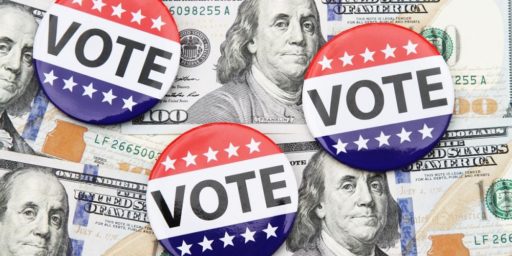Campaign Donation Disclosure and Incumbent Backlash
Public disclosure of campaign contributions makes it easier for incumbents to pressure backers of their opponent.
James Huffman, Oregon’s Republican nominee for Senate in 2010, explains in today’s WSJ “How Donor Disclosure Hurts Democracy.”
In the debates about campaign-finance regulation and the Supreme Court’s Citizens United decision of last year, there seems to be widespread agreement on one thing: Public disclosure of political contributions is a good thing. That was my view as well, until I campaigned as the Republican nominee for the U.S. Senate seat in Oregon in 2010.
The reality is that public disclosure serves the interests of incumbents running for re-election by discouraging support for challengers. Here’s how it works.
A challenger seeks a contribution from a person known to support candidates of the challenger’s party. The potential supporter responds: “I’m glad you’re running. I agree with you on almost everything. But I can’t support you because I cannot risk getting my business crosswise with the incumbent who is likely to be re-elected.”
[…]
Disclosure makes threats possible, and fears of retribution plausible. Within weeks of a contribution of $200 or more, the contributor’s name appears on the public record. Contributors know this, and they know that supporting the challenger can, should the challenger lose, have consequences in terms of future attention to their interests. Of course no incumbent will admit to issuing threats or seeking retribution, but the perception that both exist is widespread.
This is indeed a legitimate fear. Of course, any limitation on campaign fundraising–including institution of public financing–works to the advantage of incumbents.
There’s no way to simultaneously inform voters about who’s backing a candidate and keep that information secret from other candidates, including the incumbent. And it’s quite plausible, indeed, that victorious incumbents will hold grudges against those who spent money trying to get them ousted.
Is that rational concern enough to justify making political donations secret? After all, the secret ballot–the notion that it’s nobody’s business who you’re voting for–is a cherished part of of political culture and publishing one’s donations pulls the veil off.
Then again, as Jonathan Adler notes, disclosure “gives voters additional information and could make it easier to assess corruption claims.” Is that trade-off worth it?
UPDATE: Megan McArdle offers and interesting suggestion:
I’ve long toyed with the notion that we should go the other way: allow unlimited donations, including from corporations. But force them to go through an institutions which strips off the names and pools the money, so it’s impossible to see who donated, or even the size of the individual donations. Once a month, you get a check from the campaign finance bank, and that’s it.
I have no idea whether this would pass constitutional muster. But it would certainly cripple lobbying via campaign contributions, while allowing people to give as much support as they wish to candidates who they think will further their interests. The overall result would probably be much less money in politics, with candidates much more dependent on small donors. And it’s possible that this could advantage incumbents–who get free television time–even more.
Commenters retort that anonymous donations wouldn’t preclude donors communicating to incumbents that they’d donated. But nothing would preclude saying you’d donated when you hadn’t, either.
Ultimately, I doubt this would work given the number of signaling devices available. But that’s why I’m skeptical of the campaign finance reform enterprise generally: motivated people will figure out ways to game the system, regardless of the system.
The problem isn’t as much the influence of money in politics but the influence of politics on money.






One way to solve the problem is to adopt my plan for campaign finance reform.
All challengers would be allowed to raise money without limit up until a date certain established by the FEC. These donations would be kept secret as to the name of the donor. At the cut-off date, the federal government would match the highest challenger’s total and all funds would be dispersed by an accounting firm according to directions from the individual campaigns. If the challenger won the election, the donor list would be made public. If they lose, it is destroyed.
Incumbents would be prohibited from raising or accepting any money while in office. This would free up about 6 hours each day that every sitting congressman or senator now spends on fundraising. By eliminating the fundraising advantage of the incumbent, it allows for a fair debate of ideas at each election.
Using a system like this maintains the freedom of speech provisions necessary to allow citizens to express their ideas through contributions, but also prohibits government employees from accepting money and the influence that goes along with it.
This plan needs to be passed in conjunction with a new congressional pay plan that vastly increases compensation, travel and housing reimbursement.
jwest: Thank you for showing the problem that any entity that wishes to cut Federal spending will face in doing so. Exactly WHERE are you going to get the money for this expansion of Federal power and intrusion by the government into the electoral process? The voters spoke their piece last year–they are fed up with sthe ever expanding role of the government in the lives of the salt of the earth citizens. Haven’t you been listening to Sean, Rush, Sarah, and Michelle?
Alas, it is easy to lose our way on the deficit when we are looking at a power that we would like to wield. So very easy. Apparently, just as easy from the right as from the left.
I agree with the idea of public disclosure of who donates how
much to a national candidate.I also think that all candidate
should be limited to the same amount they may spend on
their campaign. this would level the playing field. A far as
media coverage, it should be limited also to the same
amount for each candidate and time should be donated
by the media with equal coverage for each. I think about 15
minutes a day would more than suffice.After all, the media
does need to provide a level of public service for the right to
broadcast on the airways.We do not need to be over burdened
with ads that are lopsided to a specific candidate or party. The
voters need to spend the time to investigate for themselves
which candidate they want to support. To vote blindly for for a
given party without knowing the character of the candidate
is in my opinion kind of stupid. After all I believe most candidates
represent their own interests much more than they do their
constituents. I also believe their should be term limits for each
Representative and Senator. I don’t believe our Founders wanted
career politicians.
Again, this is my opinion only.
Defecit Hawk,
If you’re truly interested in reducing the amount the federal government spends each year (as I am), you need to eliminate the incentives elected officials have to spend more. One way to do that is to stop the ability of entities that want additional spending from contributing to sitting politicians in exchange for their vote.
The cost of financing the incumbent’s campaigns is minor in comparison to what could be saved if elected officials were focused on the business of the country and not perpetual fundraising.
As I mentioned in the first comment, this proposal needs to be accompanied by a change in the pay structure for federally elected officials. This would open the process to individuals who are not independently wealthy and would provide an incentive to balance the budget.
I propose that base pay for congressmen be increased to $500,000 and $750,000 for senators. Each would receive a bonus of an amount equal to their base pay every year the budget is passed with expenditures equaling or less than previous year’s receipts plus an increase of the actual inflation rate. These officials would also receive NetJets cards for a minimum of 25 hours/yr (increasing based on distance from D.C.) and a housing allowance of $10,000/month.
Spending a few billion like this would save trillions in the long run.
@jwest: Your plan is likely unconstitutional but interesting as a matter of policy.
@APL: Limiting both candidates to the same amount, far from leveling the playing field, would make it virtually impossible to oust incumbents. They generally have far superior name recognition and have the ability to buy votes with tax dollars.
James,
Why would you think the plan potentially unconstitutional? It allows for free speech in the form of donations to the challenger and although it prohibits a federal employee from accepting cash (which shouldn’t be too much of a stretch for the Supreme Court) it matches the amount for a seemingly level playing field.
Whose rights are being trampled?
@jwest: I think federal matching funds for one side would have 1st Amendment issues. Certainly, limits on outside groups running ads for the incumbent would. And absent that, the plan doesn’t make sense–it just transfers taxpayer money to incumbents.
James,
Outside groups could still do unlimited issue advocacy, but I believe direct campaigning could be effectively blocked with the matching provision.
How do you feel about the pay provisions?
@Jwest: I tend to think Congress is underpaid given the level of people you’d like to attract. But many manage to cash in.
If Huffman is describing things correctly, isn’t the real problem here the incumbent who feels free to deal out personal rewards or retribution? Didn’t that used to be known as corruption?
@Dave E: Most of it falls short of actual corruption, at least in terms of how we’ve structured the rules. But personal access to the Senator, prompt attention to your company’s concerns, etc. are doubtless more likely for big contributors than big opponents.
The logical error seems to be in thinking that incumbents don’t also have a contribution trail.
Sure, they have added name recognition, but if they’ve got disclose umpty-ump million from a union or a hedge fund, someone can run against that.
BTW, regard this as a really shallow idea, to protect the “most recently guilty.”
Or worse, “all the cool kids are against disclosure.”
I like Glenn Reynolds suggestion to force all contributions to be truly anonymous. Hard to arrange the kickbacks and corruption if the insiders can’t connect the dots.
Because a contributor would never, ever, tell the politician that he/she/it gave him or her a lot of money…
The only thing this would conceal is some regular guy giving a candidate $500.
It would conceal another thing, which I guess why certain people are championing this idea, voters and watchdogs would have no idea about how much money politician X got from entity Y.
But big donors would make sure that the candidate would know that they had donated to them. They could even send someone over and show the politician the money being transfered, and then telling him or her what they wanted for it.